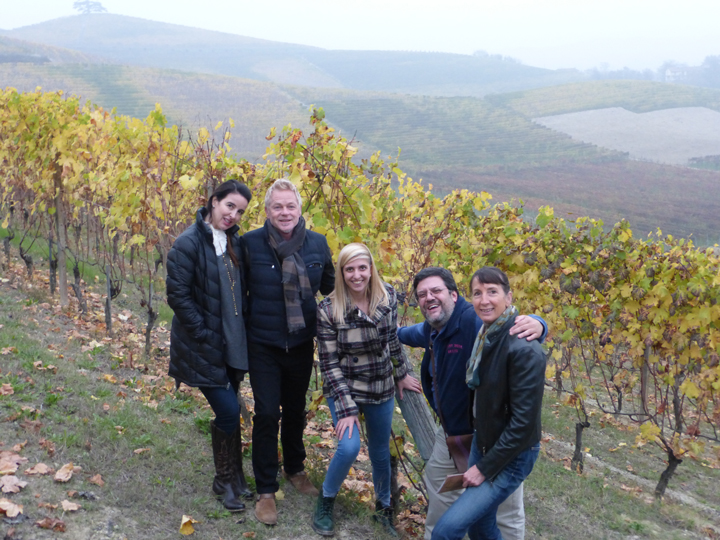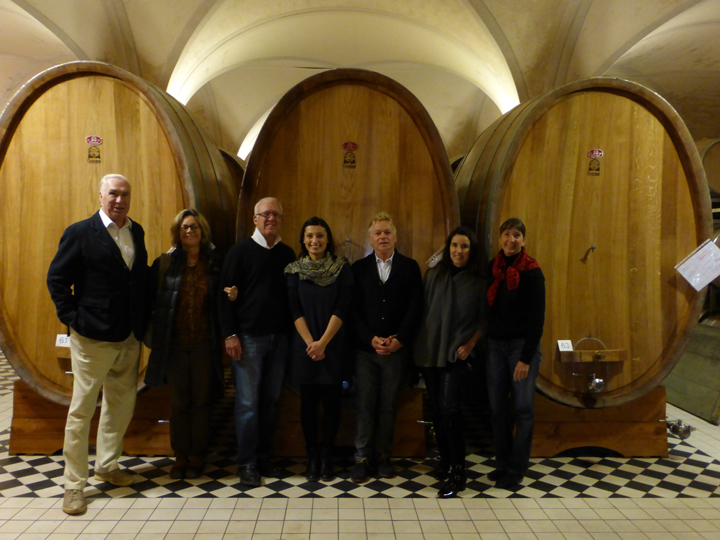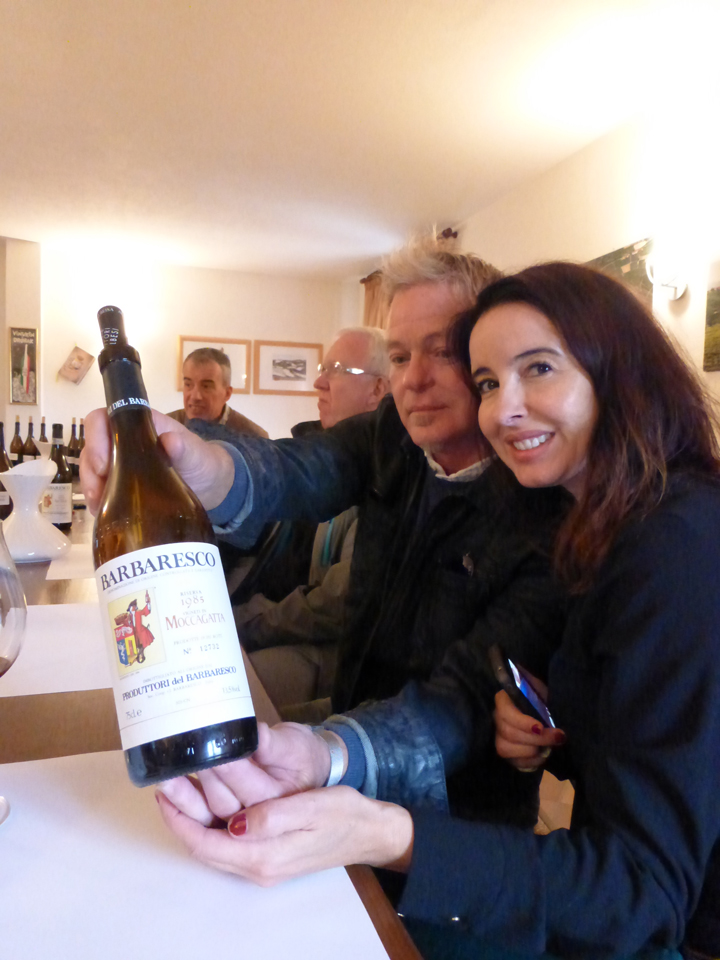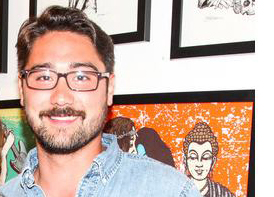
Wine On The Road isn't your normal retreat. In the way that wine travel goes, it's more like a senior these or graduate school residency: you go in higher pursuit of a passion; and, in return, are rewarded with a comprehensive experience that takes you deep into the fields and cellars to find out why you love that varietal or vintage so much. And Ben Weinberg isn't your normal tour guide. Relying on years and years of building relationships with only the best and most engaging winemakers in regions all over the world, his fellow travelers return home with more than an album full of photographs and a couple cases of local wine — they often walk away with long-lasting friendships with winemakers and wine drinkers alike.
We caught up with the Chief Wine Sherpa, who loves Piedmont, knows the best winemakers are farmers (and farmers are the best winemakers), and is quick to blame his wife for his niche travel business's success.
Michael Woodsmall: How did all of this begin? Where would Wine On The Road find its roots so to speak?
Ben Weinberg: My original career was in the business law, but I wasn’t very happy with what I was doing. That being said, one of the great advantages of being “overeducated” is that you can afford good wine; so while I wasn't very happy with what I was doing, I actually had a cellar — a nice cellar.
One night my wife told me that I should go find myself. I asked her, “What should I do?” She said, “Well, you love wine. People come over and you pull out of a bottle and you generally send them away with literature you have printed for them about that bottle. Maybe you should do something with wine.” I went to the store where I bought a lot of my cellar and I told the owner, who I had become friends with, that I was changing my life.
[Editor Jameson Fink's Top Ten Wine Destinations In The World]
I went on to work for him for three months, basically stocking shelves at $9 per hour, knowing I would make connections. Then I started working as a wholesale distributor, and six months later I was contacted by one of the larger stores to be their fine wine manager. And it was a great job: all I did was taste good wine all day, see what I could sell, and develop a private client list. About three years into that, the owner of the store asked that I write a column for a very local newspaper, and that column ended up being an immediate success. At that point, I decided I was going to get into writing about wine. Next was the Rocky Mountain News — which had a much larger circulation, but would eventually go bust — where I had a column for about 10 months, and I started getting samples and business cards from importers and distributors and wineries and I built a social media list off of that.
I then started traveling the world and tasting wine and writing about it. But freelance writing is a challenging business; I realized I was successful at it reputationally, but the financial rewards were not coming in. Thus the Wine On The Road concept. Because of my already established relationships with these dedicated, passionate, and occasionally very famous winemakers and winery owners, I was able to bring consumers to these wineries and get them special opportunities that they wouldn’t have otherwise.
The business model I have developed has really been to work with other people in the wine trade — such as sommeliers at regionally focused restaurants, as well as the owners and chefs, and high-end wine stores — and to take their customers to regions they love. And usually the sommeliers and owners and chefs come along. We take care of all the expenses, but we use that person’s affinity list to show their loyal followers the behind the scenes happenings.
There are quite a few of these "wine travel" bureaus that claim to give extremely personalized experiences. What differentiates yours?
I think the the behind the scene look at a highly placed wine professional's trade and how they go touring is a big part of what we do. But another part is we’re creating smaller affinity groups that build relationships. There is no better place to be than wine country on vacation, and the ability to connect with like-minded people… we foster that. We’re not merely bringing one of our wine sherpas along, we’re also making sure that the object of all the clients’ affection is coming to.
[Uncorked: Ben Weinberg Shares His Travel Don'ts]
The fact is that if you can think of it, someone else has already done it on the internet. There is nothing unique that come through social media. Everybody does everything. So you have to figure out where there is uniqueness, and to me, the unique part (is there is one) is the offline part — the people who are going, the people who are coming as associate wine sherpas, the people that we are meeting there and understand that we’re trying to build relationships.

Then is that what you are most proud about? Building relationships?
One of the things that has become very apparent to me, is that even the people who love wine and have a cellar are not nearly as into the intricacies of wine as those of us in the business. I’m proudest of the continuing relationships they have with the producers they meet on the trips. The one example that comes to my mind is Chiara Abbona of Marziano Abbona winery in Dogliani, Piedmont. She has been very lovely to me — we have had lunch at her family winery — and they have a series of labels for their bottles that feature the local indigenous birds, and she always prepares a packet for my travelers that contains a set of the loose labels. And some of my travelers have, in turn, put them into shadow box frames and taken photos, sending those back to her. So there are these continuing relationships. You can get bogged down in trying to re-explain over and over again which vintages to hold back, and which to drink currently; and while that is very important information, it is the bonds that are formed that ultimately stand out.
How has your appreciation of wine evolved over the years?
I think we all start out in wine with a more blunt palate. People start out appreciating wine for strong flavors and strong experiences — because that is what becomes immediately memorable. And for some people, that is as far as they go. But the people who come on my trips have evolved from that, and they appreciate more subtle differences in things. And I think that that’s a philosophy that isn’t only about wine — that’s more a philosophy of life: to not look for the great gaps, but to look for the smaller, more subtle differences. This is probably why Europe is such a great destination for what we do, because of the micro-regionality. These communities that are close to each other have what they consider to be very important differences between them. An outsider will say they look exactly the same. But once you go down to street level, and start experiencing the communities separately, and you’ll realize there are some differences. And while they might not be big differences, these differences are important to the people, and therefore they are important to me. It creates an understanding of why and how people might be different.
Being as well traveled as you are, do you have any particular insights to the conversation surrounding global climate change?
There is certainly no debate in the farming community of global climate change. You can’t call it global warming because it is more about variability and oscillation that it is about everything getting warmer. And most winemakers are farmers, especially the good ones. So this is a huge issue. But some are being affected positively. German Riesling has just gone crazy in the last couple years, fatter and plumper. But that band of climate will eventually pass them by.
[Climate Change: California's Future Invokes National Concerns]
One of the most interesting elements for me is to be able to directly compare the dichotomy between old style and new style. And after twenty or thirty years in the bottle, those two styles of wine get closer and closer until it is very difficult to tell them apart. One of the things that climate change does, is that it is becoming so powerful and so obvious that people are banding together to find a solution, and one of those solutions seems to be an evolution in the grape itself. A way to help change the grape and the vine to make them more resistant to the climate. And this will give us time to figure out what more to do.
Once that reaches its natural limit, you have to talk about different parts of the world, and of each terroir. That is a really interesting question: uprooting people and making them move and figure out where to go.
So does this affect one region more than the other? If you had to help people prioritize their travel with regard to which is/are changing the fastest, how would you do that?
Anywhere that you’re growing grapes that have a long hangtime, such as the south of France and Italy, Mendoza, and South Australia — all later harvests of red wine grapes — the more they can be subject to these changes. They are very susceptible to these problems.
But the issue isn’t the grapes, it is the ecosystem. It is this idea that because it gets warmer two days earlier, a caterpillar gets its mating cycle interrupted which means a robin can’t feed on it. It’s a butterfly effect. No one knows what the effect of these sorts of chains being interrupted are. And I think that is the biggest threat. There is a systemic issue. The collapse of the ecosystem is going to be more detrimental than the fall of any one crop.
 To end on a lighter note, what is your favorite place/region you've visited, or trip you've taken?
To end on a lighter note, what is your favorite place/region you've visited, or trip you've taken?
They’re all places I love to go, whether it is for the grape or for the people, or both. But If I had to pick one region, one trip, it would probably be the first one we ever did: the Piedmont of northern Italy, during the truffle festival. The welcome I received from the winemakers and growers and the understanding of the idea of creating community among the people behind the wines and those who consume them, and being able to put a personal element into the consumers’ enjoyment of the bottles. I still talk to all those people who came on the first tour. Everything I learned about tourism was amazing to me.
The second trip I took to Piedmont was also memorable, when Aldo Vacca of Produttori del Barbaresco, spent an hour literally expounding on the terroir and the differences and why the mountain ranges and the middle of Barolo meant different things for each side of it, and the history for a 1,000 years of the area, then merging that into an explanation of his father and his connection to Produttori — this stewardship element is really common to all the people we visit, and it becomes an integral part of what we do to explain that winemaking is farming, and farming is about stewardship and sustainability. It’s even bigger than climate change, and to connect the soil and the generations that till it to the customers of those wines is a thrilling experience.
If you are a restaurant chef/owner or head somm, or if you own a high-end wine store, and you are interesting in working with Wine On The Road to create your own tour of wine country, contact Ben at [email protected].










